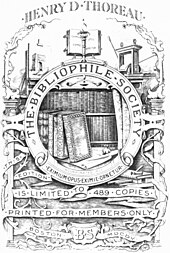Bibliophilia
Bibliophilia or bibliophilism is the love of books. A bibliophile or bookworm is an individual who loves and frequently reads or collects books.
Bibliophiles may have large, specialized book collections. They may highly value old editions,
Profile
The classic bibliophile loves to read, admire and collect books,[A] often amassing a large and specialized collection. Bibliophiles usually possess books they love or that hold special value, as well as old editions with unusual bindings, autographed, or illustrated copies. [3] "Bibliophile" is an appropriate term for a minority of those who are book collectors.[4]
Usage of the term
Bibliophilia is not to be confused with bibliomania, a potential symptom of obsessive–compulsive disorder involving the collecting of books to the extent that interpersonal relations or health may be negatively affected, and in which the mere fact that a physical object is a book is sufficient for it to be collected or beloved. Some use the term "bibliomania" interchangeably with "bibliophily", and in fact, the Library of Congress does not use the term "bibliophily," but rather refers to its readers as either book collectors or bibliomaniacs.[5][verification needed]
History
According to Arthur H. Minters, the "private collecting of books was a fashion indulged in by many
See also

- Book collecting
- Bibliophobia
- Oxford University Society of Bibliophiles, UK
- United States:
- Similar terms
- Audiophilia
- Cinephilia
- Comicphilia
- Telephilia
- Videophilia
References
Notes
- bibliophile. In its earliest iterations, it had a negative connotation—that is, it denoted an idler who read rather than worked. Over the years its meaning has drifted in a more positive direction.[1] Another meaning of the word is "a person who pays more attention to formal rules and book learning than they merit."[2]
Citations
- Merriam Webster. Retrieved June 18, 2019.
- ^ "Bookworm". synonyms. Retrieved June 19, 2019.
- ^ Holzenberg, Eric. "The Bibliophile as Bibliographer". The papers of the Bibliographical Society of America. 104.4 (2010): 421–431.
- ^ Carter, John, Nicolas Barker and Simran Thadani. 2016. John Carter's ABC for Book Collectors, p.45. Ninth ed. New Castle Delaware: Oak Knoll Press.
- ^ "Home | Library of Congress". Library of Congress. Archived from the original on Dec 25, 2023.
- ISBN 0-668-04598-1.
- ^ "bibliophile". Merriam-Webster.com Dictionary. Retrieved 2022-07-01.
- ^ "bookman". Merriam-Webster.com Dictionary. Retrieved 2022-07-01.
- .
- ^ "The Inflation Calculator". westegg.com. Retrieved 2022-06-20.
- A Gentle Madness: Bibliophiles, Bibliomanes, and the Eternal Passion for Books. New York: Henry Holt.
- Merriam-Webster, Inc. (1996). ISBN 0-87779-709-9.
Further reading
| External videos | |
|---|---|
- Bulletin du Bibliophile (1834-) Bulletin du bibliophile (1834). Since 1963 published by the Association Internationale de Bibliophilie.
- Richard de Bury (1902). The Love of Books: "The Philobiblon" translated by E. C. Thomas. London: Alexander Moring
- Thomas Frognall Dibdin (1809). Bibliomania. New York, Henry G. Bohn.
- Holzenberg, Eric. "The Bibliophile as Bibliographer". The papers of the Bibliographical Society of America. 104.4 (2010): 421–431.
- Andrew Lang (1881). The Library. London, Macmillan & Co.
- Purcell, M. (2019). The Role of Librarians in a Historical Age of Obsession. Literary Hub.
- Rugg, Julie (2006). A Book Addict's Treasury. London: Frances Lincoln ISBN 0-7112-2685-7
- Stebbins, Robert A. (2013). The Committed Reader: Reading for Utility, Pleasure, and Fulfillment in the Twenty-First Century. Lanham, MD: Scarecrow.
External links
 Media related to Bibliophilia at Wikimedia Commons
Media related to Bibliophilia at Wikimedia Commons The dictionary definition of bibliophilia at Wiktionary
The dictionary definition of bibliophilia at Wiktionary- Forbes article on bibliomania, by Finn-Olaf Jones, December 12, 2005] (archived 14 September 2007)

